Vinh Phu Pham
Dr. King will always be remembered as a progressive civil rights leader who championed the fight for racial equality and inspired countless people around the world. However, his life is often reduced to a series of inspirational quotes (not to mention all the misquotations), rather than remembered as the complex and difficult struggle it was—a fight that encompassed both social justice and peace, alongside personal turmoil. As we commemorate Dr. King’s legacy today, let us revisit some important reminders of why he remains a powerful symbol of social progress.
Let it be known that Martin Luther King Jr. was a radical—radical in the sense that he was willing to act even when it was neither safe nor convenient, particularly in a nation long divided by its racialized past and ongoing social inequalities. He believed that the status quo of injustice needed to be directly confronted, and he committed himself to that cause. In his famous “Letter from Birmingham City Jail,” he wrote, “we know through painful experience that freedom is never voluntarily given by the oppressor; it must be demanded by the oppressed.” He also declared, “now is the time to raise our voices for equality.” King’s call led to many peaceful protests across America—some entirely nonviolent, including one in Montgomery during which demonstrators sang hymns. This kind of activism was radical not only because it opposed racism, but because it insisted on human rights and social justice more broadly.
We must also remember that King, like many progressive leaders of his era, was deeply concerned about the Vietnam War, which he described as an “enemy of the poor.” He believed that the war distracted Americans from addressing urgent social justice issues at home and disproportionately harmed low-income communities, particularly by sending young men—often from marginalized backgrounds—into combat. He was outspoken against the drafting of the poor to fight in a conflict far removed from their lives. While some progress has been made since then, class-based disparities in military recruitment persist today.
King viewed America’s involvement in Southeast Asia as a betrayal of its own ideals—the very ideals it claimed to represent, such as liberty and equality. In 1967, speaking at Riverside Church, he said, “I knew that I could never again raise my voice against the violence of war without having first spoken clearly to the greatest purveyor of violence in the world today — my own government.” His stance aligned with a broader anti-imperialist discourse, shared by many activists who envisioned global liberation beyond national borders.
Tragically, Dr. King would not live to see the end of the war. While planning a major rally in Washington, D.C. for April 27, 1967, to protest what many viewed as an unjust war, he was assassinated outside his hotel room. The day after his death, 250,000 people attended the rally, led by Dr. Ralph Abernathy and Coretta Scott King. The 1968 Poor People’s Campaign became one of the largest civil rights demonstrations in U.S. history and laid the groundwork for future movements.
Beyond civil rights, Dr. King was committed to broader social justice issues, including education, health care, housing, and economic security. The Fair Housing Act of 1968 stands as one example of the kind of tangible progress he envisioned. We remember him not only as someone who spoke powerfully about race, but as an advocate who fought for structural change. For King, equality was not merely rhetorical—it required the transformation of material conditions for those most in need.
Today, we can honor Dr. King by continuing the fight against injustice wherever it exists—whether in the realm of immigration reform, workers’ rights, or beyond. The United States, like many nations, has endured both internal and external conflicts on its path toward progress. Yet many remain forgotten or left behind in our ongoing history of inequality. It is not enough to simply speak of equality; our laws and actions must consistently reflect the values we claim to uphold. This is especially vital as we seek to move beyond the legacies of slavery and segregation and toward a society where all citizens enjoy equal opportunity in every aspect of life.
The legacy of Martin Luther King Jr. is one that deserves both remembrance and reflection. He was radical because he stood for equality even when it was unpopular or dangerous to do so. It’s important to remember that King did not just have a dream—he worked tirelessly for policy change and fought for the rights of the marginalized. We do justice to his memory not only by quoting him, but by recognizing him as a leader who fused vision with action in pursuit of a better society.

 Politics & Economy4 years ago
Politics & Economy4 years ago
 Politics & Economy1 year ago
Politics & Economy1 year ago
 Society & Culture5 years ago
Society & Culture5 years ago
 ARCHIVES5 years ago
ARCHIVES5 years ago
 After 19751 year ago
After 19751 year ago
 Politics & Economy4 years ago
Politics & Economy4 years ago
 Politics & Economy5 years ago
Politics & Economy5 years ago
 Politics & Economy4 years ago
Politics & Economy4 years ago








